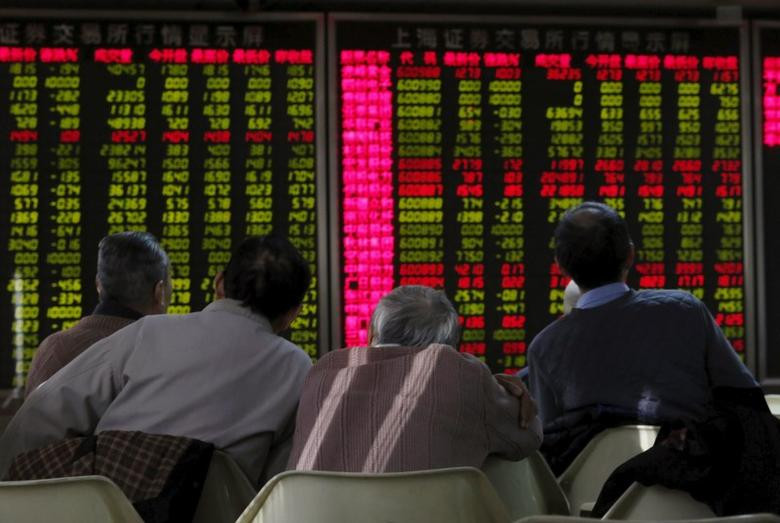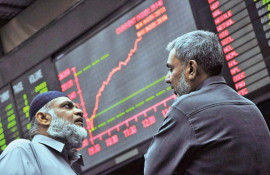
Pakistan Stock Exchange on Monday saw a tumultuous trading session as a combination of sell-off in international equity markets and the gloomy domestic macroeconomic outlook dented investor interest.
As a result, the benchmark KSE-100 index dropped 181 points, kicking off the week on a negative note.
Rumours of a further hike in petroleum prices, before the resumption of International Monetary Fund (IMF) loan programme, shattered investor confidence and added to concerns of acceleration in the inflation rate.
Fresh depreciation of the rupee against the US dollar aided the bearish momentum in the market.
On the international front, speculation about a possible interest rate hike by the US Fed on the back of better-than-expected employment data marred the overall trading environment in global equity markets.
Earlier, trading began at the Pakistan bourse with minor ups and downs as bulls locked horns with bears. However, cherry-picking lifted the market to the positive territory in early hours, but from this point onwards, the index remained range bound. A selling spree, emerging towards the end, erased all gains and the index closed with a loss.
At close, the benchmark KSE-100 index recorded a decrease of 180.76 points, or 0.38%, to settle at 47,115.04.
Arif Habib Limited, in its report, stated that the market continued to remain range bound as inflationary concerns heated up among investors after the statement of adviser to prime minister on finance that the IMF had asked the government to further increase the levy on petroleum products.
Textile sector remained under pressure as the Ministry of Energy (Petroleum Division) had already sent a summary to the federal cabinet seeking an end to subsidised gas supply to the industrial sector including the captive power plants.
The market continued to trade sideways with high trading volumes in third-tier stocks. On the flip side, institutional activity remained lacklustre.
In the last trading hour, profit-taking was witnessed across the board, led mainly by the technology sector.
Sectors contributing to the performance included technology (-45 points), exploration and production (-28 points), banks (-26 points), pharmaceutical (-20 points) and engineering (-19 points), the report said.
JS Global analyst Muhammad Mubashir said that a lacklustre session was witnessed due to uncertainty about the IMF programme. The market touched a high of 47,442 (+147 points).
“Inflationary concerns and statement of adviser to prime minister on finance regarding a further hike in levy on petroleum products triggered profit-taking across the board,” he said. “The market closed at 47,115, down 181 points.”
Total traded volume stood at 365 million shares with Hum Network (+3.3%), Telecard (+2.1%), First National Equities (-3%), Ghani Global Holdings (+2.2%) and WorldCall Telecom (-3%) being the highest contributors.
“Going forward, we believe the market is adopting a cautious approach with anticipation of a hike in policy rate in the upcoming monetary policy. It is recommended to investors to keep booking profit and any dip could be seen as a buying opportunity,” the analyst said.
Overall trading volumes decreased to 364.9 million shares compared with Friday’s tally of 469.9 million. The value of shares traded during the day was Rs12.8 billion.
Shares of 368 companies were traded. At the end of the day, 125 stocks closed higher, 228 declined and 15 remained unchanged.
Hum Network was the volume leader with 39.6 million shares, gaining Rs0.23 to close at Rs7.24. It was followed by Telecard Limited XB with 30.1 million shares, gaining Rs0.39 to close at Rs19.02 and First National Equities with 26 million shares, losing Rs0.31 to close at Rs10.04.
Foreign institutional investors were net sellers of Rs64.22 million worth of shares during the trading session, according to data compiled by the National Clearing Company of Pakistan.



1732263441-0/BeFunky-collage-(81)1732263441-0-165x106.webp)
1732263755-0/musk-(3)1732263755-0-165x106.webp)












COMMENTS
Comments are moderated and generally will be posted if they are on-topic and not abusive.
For more information, please see our Comments FAQ